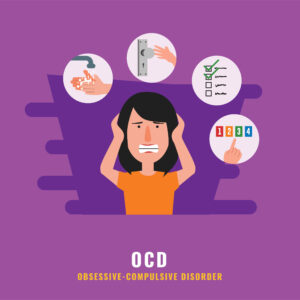Obsessive Compulsive Disorder (OCD) and anxiety disorder are two of the most commonly diagnosed mental illnesses in the United States. In fact, they’re so common that they’ve been labelled “Anxiety Disorders.” If you’re not sure if you have OCD or anxiety, now is a good time to find out. And if you do have one of these conditions, it’s important to know what to do about it. In this blog post, we will discuss what OCD and anxiety are, their symptoms, and how to get help. We also recommend resources for more information and support.
Contents
What is OCD?

Obsessive-compulsive disorder (OCD) is a condition in which people have recurring, intrusive thoughts or images that they can’t get out of their minds. These thoughts may cause anxiety or distress. OCD can also lead to other problems, such as difficulty concentrating or sleeping.
OCD is most common in people between the ages of 12 and 25. It’s not known why it happens, but there are a few things that may contribute. Some people with OCD might have a gene that makes them more likely to develop the condition. Other factors include:
- Having a family history of OCD
- If you had traumatic events in your life, like sexual abuse or being bullied
- Having a mental illness like depression, bipolar disorder, or schizophrenia
If you think you might have OCD, talk to your doctor. There are treatments available that can help relieve the symptoms of the condition.
What are the symptoms of OCD?
There is no definitive list of symptoms, as the two disorders can overlap significantly. However, some general signs that someone may have OCD include severe and persistent thoughts or images that are intrusively intrusive; restraining or excessive rituals or compulsions (e.g., hand-washing, checking to see if doors are locked); feeling constantly anxious and on guard; difficulty concentrating or remembering details; and disturbing thoughts or fears that seemingly have no basis in reality.
It’s important to note that not everyone with OCD will experience all of these symptoms. In fact, many people with OCD don’t experience any specific symptoms at all – they simply have a persistent fear or concern about something. If you’re concerned that you might have OCD, it’s important to speak with your doctor. There is currently not enough evidence to suggest a specific treatment plan for people with OCD, but therapy and medication may help relieve some of the symptoms.
What Are The Four Types Of OCD
People with OCD often experience intrusive thoughts and images that they can’t shake. These thoughts or images can be about anything, from insignificant objects to deeply personal matters. People with OCD may also have a repeated belief that a particular thought or image is harmful or must be avoided.
There are four main types of OCD: obsessions, compulsions, adverse mental effects (AMEs), and neutralizing behaviours. Obsessions are the persistent thoughts or images that cause problems for people with OCD. Common obsessions involve fears, doubts, and scary scenarios. Compulsions are the rituals or behavioural routines that people with OCD use to try to ease their anxiety and reduce their stress levels. Compulsions can take many different forms, from hand-washing to counting steps. AMEs are the physical symptoms that accompany obsessive thoughts and images in people with OCD. These symptoms can include muscle tension, tingling, sweating, and nausea/vomiting. Neutralizing behaviours are any actions taken by people with OCD in an attempt to stop their obsessions from getting in the way of their lives. This could mean avoiding certain situations or activities, cleaning excessively, or endlessly repeating certain words or phrases
What is anxiety disorder?
 Anxiety disorder is a mental health condition in which people experience persistent and excessive anxiety. It can be debilitating, impacting everything from daily life to work and social activities. There is no single cause of anxiety disorder, but it is often caused by factors such as stress, family history, and traumatic events.
Anxiety disorder is a mental health condition in which people experience persistent and excessive anxiety. It can be debilitating, impacting everything from daily life to work and social activities. There is no single cause of anxiety disorder, but it is often caused by factors such as stress, family history, and traumatic events.
- People with an anxiety disorder may experience one or more of the following symptoms:
- Persistent worry or fear about different situations or tasks
- A constant feeling of dread or terror
- Sharply elevated moods or feelings of happiness and well-being that eventually fade
- Insomnia or difficulty sleeping due to worries or fears about being alone or unsafe during the night
- Racing thoughts and a sense of being unable to calm down even after a restful sleep
- People with an anxiety disorder may also experience physical symptoms such as diarrhoea, headaches, chest pain, nausea, and weight gain.
Is OCD The Same As Anxiety?
There is a lot of confusion about the difference between OCD and anxiety. The most important difference is that anxiety is a general feeling of worry, fear, and insecurity, while OCD is an obsessive-compulsive disorder. Other key differences include the following:
OCD people have persistent and recurrent thoughts or images that are experienced as intrusive and distressing. Anxiety usually arises when there is a specific danger or threat in the present situation.
OCD people often seek out repetitive behaviours or rituals to try to neutralize their fears, but these strategies often backfire and make the problem worse. People with anxiety may avoid situations that cause them discomfort, but this behaviour typically only lasts for a short period of time.
Finally, OCD tends to be more severe than anxiety disorders. In fact, roughly half of all people who experience OCD also meet the criteria for one or more other psychiatric disorders.
Can You Have Both OCD And Anxiety Disorder?
There is a lot of overlap between the two conditions, but there are some key differences, too. Here’s what you need to know about OCD and anxiety disorder.
The hallmark symptoms of OCD are intrusive, unwanted thoughts or images that typically occur multiple times a day. Some examples of typical obsessions might involve fear of contamination, religious obsessions, or fear of numbers.
People with OCD may also have repetitive behaviours or rituals in an effort to reduce their anxiety. These could include excessive hand-washing, checking rituals such as door locks or counting steps.
Anxiety disorders are a group of mental disorders characterized by feelings of apprehension and dread that can interfere with daily life. Common symptoms include feeling on edge all the time, muscle tension and headaches.
Many people with anxiety disorders experience significant impairment in their ability to function at work or school, which can significantly impact their quality of life.
What are the treatments for OCD and anxiety disorder?
 There are a variety of treatments available for OCD and anxiety disorder, including medication, therapy, and self-help.
There are a variety of treatments available for OCD and anxiety disorder, including medication, therapy, and self-help.
Medications
There are a number of medications that can be used to treat OCD and anxiety disorder. The most common type of medication is called an SSRI (serotonin/norepinephrine reuptake inhibitor). These medications work by reducing the amount of serotonin and norepinephrine in the brain. Some people also find that they respond well to type 2 diabetes medications or beta blockers.
Therapy
OCD and anxiety disorders can often be treated with therapy. This might involve individual or group sessions. The focus of therapy may vary from person to person, but typically it will involve help in managing the symptoms of OCD and anxiety disorder.
Self-help
There is also a range of self-help resources available for people with OCD and anxiety disorder. These include books, online resources, and support groups. It is important to remember that self-help should not replace professional help if it is needed.
Conclusion
OCD and anxiety disorders can be extremely debilitating, causing sufferers significant distress and impacting all aspects of their lives. If you or someone you know is struggling with OCD or anxiety, it is important to get help as soon as possible. There are a number of resources available that can provide the support needed to overcome these conditions. Remember: there is always hope, and with the right resources and support, anyone can overcome this challenge.
For more information and guidance, please contact OCDMantra. OCD is a mental health disorder characterized by obsessions and compulsions. If you have any queries regarding OCD treatment, OCD Counseling, ERP therapy experienced therapists at OCDMantra can help: Book a trial OCD therapy session


